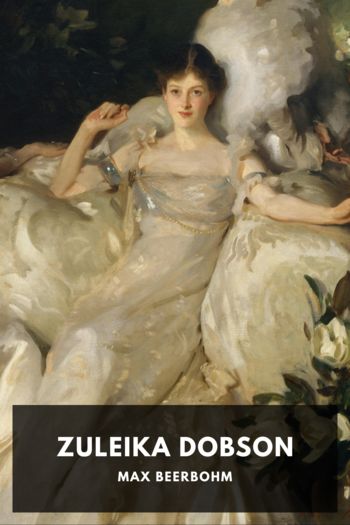Zuleika Dobson, Max Beerbohm [e ink ebook reader TXT] 📗

- Author: Max Beerbohm
Book online «Zuleika Dobson, Max Beerbohm [e ink ebook reader TXT] 📗». Author Max Beerbohm
“Oh, happiness be hanged!” said Marraby.
To the Duke this seemed a profoundly sane remark—an epitome of his own sentiments. But what was right for himself was not right for all. He believed in convention as the best way for average mankind. And so, slowly, calmly, he told to his fellow-diners just what he had told a few hours earlier to those two young men in Salt Cellar. Not knowing that his words had already been spread throughout Oxford, he was rather surprised that they seemed to make no sensation. Quite flat, too, fell his appeal that the syren be shunned by all.
Mr. Oover, during his year of residence, had been sorely tried by the quaint old English custom of not making public speeches after private dinners. It was with a deep sigh of satisfaction that he now rose to his feet.
“Duke,” he said in a low voice, which yet penetrated to every corner of the room, “I guess I am voicing these gentlemen when I say that your words show up your good heart, all the time. Your mentality, too, is bully, as we all predicate. One may say without exaggeration that your scholarly and social attainments are a byword throughout the solar system, and beyond. We rightly venerate you as our boss. Sir, we worship the ground you walk on. But we owe a duty to our own free and independent manhood. Sir, we worship the ground Miss Z. Dobson treads on. We have pegged out a claim right there. And from that location we aren’t to be budged—not for bob-nuts. We asseverate we squat—where—we—squat, come—what—will. You say we have no chance to win Miss Z. Dobson. That—we—know. We aren’t worthy. We lie prone. Let her walk over us. You say her heart is cold. We don’t profess we can take the chill off. But, sir, we can’t be diverted out of loving her—not even by you, sir. No, sir! We love her, and—shall, and—will, sir, with—our—latest breath.”
This peroration evoked loud applause. “I love her, and shall, and will,” shouted each man. And again they honoured in wine her image. Sir John Marraby uttered a cry familiar in the hunting-field. The MacQuern contributed a few bars of a sentimental ballad in the dialect of his country. “Hurrah, hurrah!” shouted Mr. Trent-Garby. Lord Sayes hummed the latest waltz, waving his arms to its rhythm, while the wine he had just spilt on his shirtfront trickled unheeded to his waistcoat. Mr. Oover gave the Yale cheer.
The genial din was wafted down through the open window to the passersby. The wine-merchant across the way heard it, and smiled pensively. “Youth, youth!” he murmured.
The genial din grew louder.
At any other time, the Duke would have been jarred by the disgrace to the Junta. But now, as he stood with bent head, covering his face with his hands, he thought only of the need to rid these young men, here and now, of the influence that had befallen them. Tomorrow his tragic example might be too late, the mischief have sunk too deep, the agony be lifelong. His good breeding forbade him to cast over a dinner-table the shadow of his death. His conscience insisted that he must. He uncovered his face, and held up one hand for silence.
“We are all of us,” he said, “old enough to remember vividly the demonstrations made in the streets of London when war was declared between us and the Transvaal Republic. You, Mr. Oover, doubtless heard in America the echoes of those ebullitions. The general idea was that the war was going to be a very brief and simple affair—what was called ‘a walkover.’ To me, though I was only a small boy, it seemed that all this delirious pride in the prospect of crushing a trumpery foe argued a defect in our sense of proportion. Still, I was able to understand the demonstrators’ point of view. To ‘the giddy vulgar’ any sort of victory is pleasant. But defeat? If, when that war was declared, everyone had been sure that not only should we fail to conquer the Transvaal, but that it would conquer us—that not only would it make good its freedom and independence, but that we should forfeit ours—how would the cits have felt then? Would they not have pulled long faces, spoken in whispers, wept? You must forgive me for saying that the noise you have just made around this table was very like to the noise made on the verge of the Boer War. And your procedure seems to me as unaccountable as would have seemed the antics of those mobs if England had been plainly doomed to disaster and to vassalage. My guest here tonight, in the course of his very eloquent and racy speech, spoke of the need that he and you should preserve your ‘free and independent manhood.’ That seemed to me an irreproachable ideal. But I confess I was somewhat taken aback by my friend’s scheme for realising it. He declared his intention of lying prone and letting Miss Dobson ‘walk over’ him; and he advised you to follow his example; and to this counsel you gave evident approval. Gentlemen, suppose that on the verge of the aforesaid war, some orator had said to the British people, ‘It is going to be a walkover for our enemy in the field. Mr. Kruger holds us in the hollow of his hand. In subjection to him we shall find our long-lost freedom and independence’—what would have been Britannia’s answer? What, on reflection, is yours to Mr. Oover? What are Mr. Oover’s own second thoughts?” The Duke paused, with a smile to his guest.
“Go right ahead, Duke,” said Mr. Oover. “I’ll reply when my turn comes.”
“And





Comments (0)